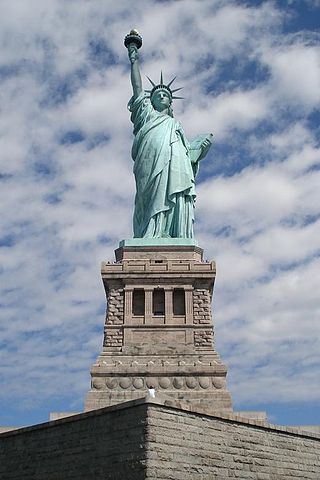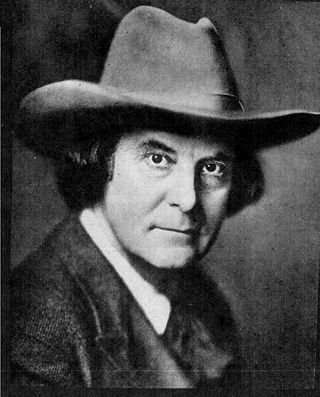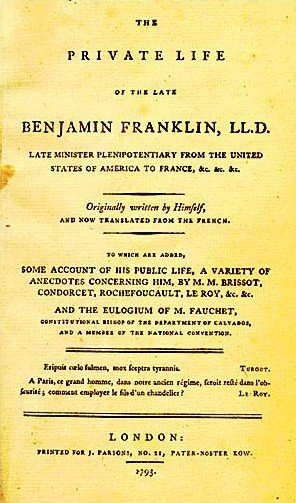
Benjamin Franklin was an American polymath who was active as a writer, scientist, inventor, statesman, diplomat, printer, publisher, and political philosopher. Among the leading intellectuals of his time, Franklin was one of the Founding Fathers of the United States, a drafter and signer of the Declaration of Independence, and the first Postmaster General.

Metonymy is a figure of speech in which a concept is referred to by the name of something closely associated with that thing or concept.

Simple living refers to practices that promote simplicity in one's lifestyle. Common practices of simple living include reducing the number of possessions one owns, depending less on technology and services, and spending less money. Not only is simple living focused on external changes such as minimalism through fewer commitments or possessions but it also connects to the human's mindset and set of beliefs. These practices can be seen throughout history, religion, art, and economics.

"Life, Liberty and the pursuit of Happiness" is a well-known phrase from the United States Declaration of Independence. The phrase gives three examples of the unalienable rights which the Declaration says have been given to all humans by their Creator, and which governments are created to protect. Like the other principles in the Declaration of Independence, this phrase is not legally binding, but has been widely referenced and seen as an inspiration for the basis of government.

The American Dream is the national ethos of the United States, a set of ideals including representative democracy, rights, liberty, and equality, in which freedom is interpreted as the opportunity for individual prosperity and success, as well as upward social mobility for oneself and their children, achieved through hard work in a capitalist society with few barriers.

Carpe diem is a Latin aphorism, usually translated "seize the day", taken from book 1 of the Roman poet Horace's work Odes.

Elbert Green Hubbard was an American writer, publisher, artist, and philosopher. Raised in Hudson, Illinois, he had early success as a traveling salesman for the Larkin Soap Company. Hubbard is known best as the founder of the Roycroft artisan community in East Aurora, New York, an influential exponent of the Arts and Crafts movement.

The Protestant Ethic and the Spirit of Capitalism is a book written by Max Weber, a German sociologist, economist, and politician. Begun as a series of essays, the original German text was composed in 1904 and 1905, and was translated into English for the first time by American sociologist Talcott Parsons in 1930. It is considered a founding text in economic sociology and a milestone contribution to sociological thought in general.
No pain, no gain is a proverb, used since the 1980s as an exercise motto that promises greater value rewards for the price of hard and even painful work. Under this conception competitive professionals, such as athletes and artists, are required to endure pain and stress to achieve professional excellence. Medical experts agree that the proverb is wrong for exercise.

Work ethic is a belief that work and diligence have a moral benefit and an inherent ability, virtue or value to strengthen character and individual abilities. It is a set of values centered on importance of work and manifested by determination or desire to work hard. Social ingrainment of this value is considered to enhance character through hard work that is respective to an individual's field of work.

The Autobiography of Benjamin Franklin is the traditional name for the unfinished record of his own life written by Benjamin Franklin from 1771 to 1790; however, Franklin appears to have called the work his Memoirs. Although it had a tortuous publication history after Franklin's death, this work has become one of the most famous and influential examples of an autobiography ever written.
The Junto, also known as the Leather Apron Club, was a club for mutual improvement established in 1727 by Benjamin Franklin in Philadelphia. The Leather Apron Club's purpose was to debate questions of morals, politics, and natural philosophy, and to exchange knowledge of business affairs.

The Richest Man in Babylon is a 1926 book by George S. Clason that dispenses financial advice through a collection of parables set 4,097 years ago in ancient Babylon. The book remains in print almost a century after the parables were originally published, and is regarded as a classic of personal financial advice.

"Self-Made Men" is a lecture, first delivered in 1859, by Frederick Douglass, which gives his own definition of the self-made man and explains what he thinks are the means to become such a man.
The law of attraction is the New Thought spiritual belief that positive or negative thoughts bring positive or negative experiences into a person's life. The belief is based on the idea that people and their thoughts are made from "pure energy" and that like energy can attract like energy, thereby allowing people to improve their health, wealth, or personal relationships. There is no empirical scientific evidence supporting the law of attraction, and it is widely considered to be pseudoscience.
Amor fati is a Latin phrase that may be translated as "love of fate" or "love of one's fate". It is used to describe an attitude in which one sees everything that happens in one's life, including suffering and loss, as good or, at the very least, necessary.

Tom Butler-Bowdon is a non-fiction author based in Oxford, England.
Observations Concerning the Increase of Mankind, Peopling of Countries, etc. is a short essay written in 1751 by American polymath Benjamin Franklin. It was circulated by Franklin in manuscript to his circle of friends, but in 1755 it was published as an addendum in a Boston pamphlet on another subject. It was reissued ten times during the next 15 years.
"Self-made man" is a classic phrase coined on February 2, 1842 by Henry Clay in the United States Senate, to describe individuals whose success lay within the individuals themselves, not with outside conditions. Benjamin Franklin, one of the Founding Fathers of the United States, has been described as the greatest exemplar of the self-made man. Inspired by Franklin's autobiography, Frederick Douglass developed the concept of the self-made man in a series of lectures that spanned decades starting in 1879. Originally, the term referred to an individual who arises from a poor or otherwise disadvantaged background to eminence in financial, political or other areas by nurturing qualities, such as perseverance and hard work, as opposed to achieving these goals through inherited fortune, family connections, or other privileges. By the mid-1950s, success in the United States generally implied "business success".













